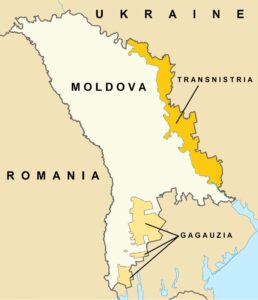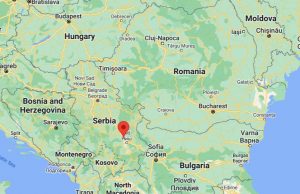
The deadly danger of revisionism in Eastern Europe: how Putin and his allies in Romania, Hungary, Moldova and Serbia are trying to throw the region into chaos
Budapest’s claim to use the flag of Greater Hungary at football matches is just the latest in a long line of events that follow historical revisionism and attempts to redraw borders in Eastern Europe. Vladimir Putin is trying through proxies or agents of influence to reignite conflicts in a few key spots in the region, banking on the support of loyal allies or useful idiots blinded by populism. If his plan goes ahead, Europe will be thrown into chaos.
Urmărește cele mai noi producții video G4Media
- articolul continuă mai jos -
Why does the Kremlin leader want to revive the issue of territorial claims in the region? There are many reasons. First, such a political development would make him no longer the only global leader who wants to redraw borders by force, the only pariah who disregards international law.
Secondly, it would create a major problem for the US and the EU, channeling their energies into new conflicts to be managed and resolved. In this way, the resources now directed by the West exclusively to Ukraine would be divided among several destinations, which would help Russia immensely. It is already a classic tactic: one fire is put out by lighting another fire.
Finally, Russia would have a better chance of installing favourable regimes in its neighbourhood to stop the European course of countries like Moldova or Bosnia-Herzegovina.
Below are the most blatant examples of revisionism and the ties to Russia of the leaders who promote them.
Hungary – Viktor Orban. The authoritarian regime in Budapest adopted the Hungarian National Strategy in 2011, which represents a de facto doctrine of hybrid revisionism: the Hungarian nation throughout the Carpathian Basin must be controlled by Budapest, even if it is de facto part of other countries, and the aspirations for territorial autonomy are publicly supported by the Orban government.
Yet territorial autonomy is the first step towards revising borders and, after the Second World War, a taboo in Europe.
Encouraged by the poor reaction of the leaders of Romania, Slovakia, Serbia and Croatia, Viktor Orban has stepped up the pace of hybrid revisionism: he has invested hundreds of millions of euros in neighbouring countries in economic, cultural, sports and religious programs and in the media, all with the aim of controlling the narratives to which the Hungarian communities in Hungary’s neighbourhood are exposed. It has succeeded – a 2022 poll shows that Hungarians in Romania overwhelmingly adopt Budapest’s ideas.
Budapest is pursuing its revisionist plan with great tenacity on all levels. Katalin Szili, Prime Minister Orban’s right-hand woman on neighbourhood issues, talks almost monthly in Romania about the need for territorial autonomy. She is also appearing more recently in Gagauzia, an autonomous enclave in Moldova politically controlled by Russia.
The latest episode is linked to the powerful symbol of Greater Hungary. Billionaire Sandor Csanyi, a Viktor Orban loyalist and head of the Hungarian Football Federation, lied to the public by claiming that UEFA had allowed the use of the large Hungarian flag at national team matches. UEFA’s denial is almost irrelevant: what is essential is Hungary’s desire to legitimize its hybrid revisionism with symbols that clearly annoy all its neighbours.
There is nothing innocent about Viktor Orban’s behaviour. The revisionism is clear, programmatic, with an obvious political goal: to preserve power by projecting the illusion that Hungary can return to its pre-Trianon borders.
And Viktor Orban’s ties to Russia are undeniable. The Budapest leader has remained Putin’s only ally within the EU and NATO. He has prevented a series of sanctions for the Kremlin, refused any aid to Ukraine, constantly propagated Russia’s „peace” narratives. He has become so annoying to his Western partners that the EU has cut off some of his funding and NATO has decided – an absolute first – to override Budapest’s veto and hold a NATO-Ukraine Council on 4-5 April.

Republic of Moldova – Transnistria and Gagauzia. The two regions of Moldova are Moscow’s tools to block any pivot of Chisinau towards the EU and NATO.
The Transnistrian separatist leaders are controlled with money and military from Moscow, despite Tiraspol’s recent economic reorientation towards European markets. After all, salaries and pensions in Transnistria are also paid by Moscow, and the Russian military contingent practically keeps the leaders of the self-proclaimed Tiraspol regime under control.
In Gagauzia, an autonomous region of about 130,000 people, Russia has been playing games for years. Elections for the region’s leadership (bașkan) are coming up, and early indications are that Russia is playing a multi-pronged game, with candidates from pro-Russian parties (the Shor Party and the Party of Socialists). The political stakes are high: the Bashkan of Gagauzia is a full member of the Moldovan government.
What’s more, the leaders in Comrat are beginning to apply a classic Kremlin recipe: ask for Russia’s help to protect them from alleged Romanian aggression. This is what happened on 25 August 2022, when Gagauz leaders announced that they would ask Russia and Turkey for help for fear that Moldova would be conquered by Romania. Russia needs these requests for help in order to attempt military intervention, as happened in Ukraine, Georgia or even Moldova in the 1990s.
Serbia vs. Bosnia-Herzegovina vs. Kosovo. Serbian President Alexander Vucic and Bosnian Republika Srpska leader Milorad Dodik act as Moscow’s pawns amid tensions between Belgrade and Sarajevo.

The two fuel inter-ethnic hatred between Serbs and Bosniaks and constantly make decisions that bring the area closer to a new conflict. In January 2022, the United States imposed financial sanctions against the political leader of the Bosnian Serbs, Milorad Dodik, whom Washington accuses of „threatening the stability” of the Balkans.
More specifically, Milorad Dodik wants to implement a separatist plan to make the Republika Srpska, an entity within Bosnia, virtually independent. He has the public support of Belgrade and Moscow.
In January 2023, Milorad Dodik presented Russian President Vladimir Putin with a medal in absentia at a ceremony marking the national day of the autonomous Serb entity in Bosnia and Herzegovina.
The financial support Milorad Dodik receives from Hungary is also significant. In July 2022, the Hungarian Foreign Minister visited Republika Srpska and announced EUR 35 million in support for the development of the breakaway region.
Serbia is also reheating the Kosovo issue. Tensions have been simmering for a year and it has taken EU intervention to force a peace deal.
It’s worth noting that tensions between Serbia, Bosnia and Kosovo are almost two decades old, with strong resentment lingering after the wars that devastated the region. What is new, however, is their sudden tension, as if a button had been pressed on command.
Romania. Diana Sosoaca, a former member of the far-right party AUR, now leader of her own party called SOS, this week tabled a bill calling for the denunciation of the 1997 Treaty of Good Neighbourliness between Romania and Ukraine and the annexation of the territories that were part of inter-war Romania.
The bill has no chance of passing a vote, and Sosoaca knows it. But the information was immediately picked up by the pro-Russian media in Moldova, which used it as a demonstration of Romania’s territorial ambitions.
Sosoaca has never hidden her sympathy for Russia. She is a constant guest at Russian Embassy events, praises the Russian invasion of Ukraine and criticizes Ukraine.
Claudiu Târziu, leader of the far-right AUR party, also talks about „the Romanian territories that are today part of the Ukrainian state” (source) – a form of non-acceptance of the current borders, but much softer than in the case of Sosoaca. Moreover, the AUR party has repeatedly promoted the ideas of Russian propaganda in Romania.
The discourse of Orban, Dodik, Șoșoaca or Târziu is reinforced by the general orientation of the electorate in those countries. However, given the constant and rapid decline of Romanians’ trust in the EU, this type of vindictive propaganda risks quickly gaining followers and voters. The irresponsible behaviour of extremist politicians, who are in the sway of Russia’s positions, has become a concrete threat to Romania. People in state institutions who now support parties like AUR or SOS from the shadows, playing obscure political games, are guilty to the highest degree.
Translated

Donează lunar pentru susținerea proiectului G4Media
Donează suma dorită pentru susținerea proiectului G4Media
CONT LEI: RO89RZBR0000060019874867
Deschis la Raiffeisen Bank


